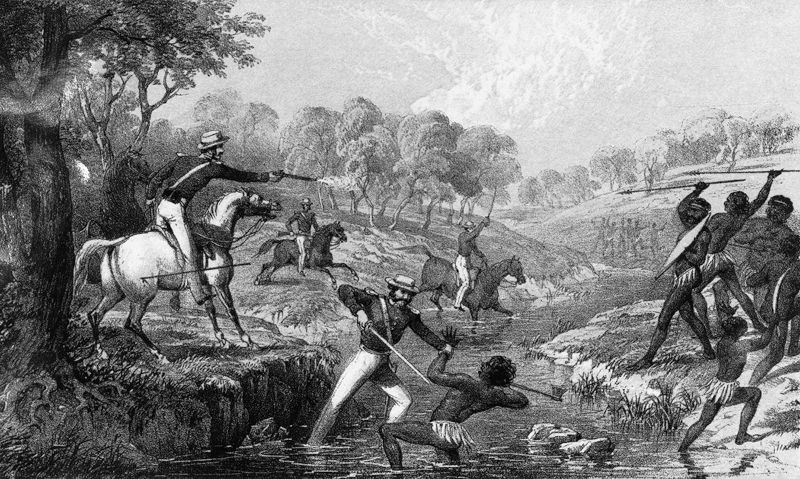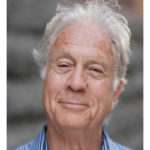War Memorial pressured into recognition of Frontier Wars
Oct 5, 2022
A watershed moment for Australia as the War Memorial, caught in a confluence of events, is pressured to announce its plans for recognition of Australia’s brutal Frontier Wars.
Last Thursday Matt Keogh, Minister for Veterans Affairs and Brendan Nelson, the Chairman of the War Memorial’s governing council, held a press conference in Canberra to announce plans to install a new’ underground geothermal heat exchange’ to heat and cool the institution. With no prior warning a radical change of policy was flagged which proved far more newsworthy than the innovative engineering.
Brendan Nelson explained that the Memorial’s council had made a decision, that we will have a much broader, a much deeper depiction and presentation of the violence committed against Indigenous people, initially by British, then by pastoralists, then by police, and then by Aboriginal militia. We will have more to say about that in due course.
He clearly spoke with the demonstrable support of the minister who said that the current $550 million expansion of the memorial would allow for greater attention to the frontier wars while adding that the recognition and reflection on frontier conflict was ‘a responsibility for all our cultural institutions.’ Further government approval followed. Minister for Indigenous Australians Linda Burney told the ABC that she welcomed the shift, explaining that the Albanese Government was committed to a truth telling process about Australia’s colonial history and ‘a failure to see that reflected in this key institution would be jarringly out of step with this new phase of national reckoning.’
Although the statement was slipped quietly into the public debate attracting little immediate media interest there will be no way for the Memorial to retreat from the foreshadowed commitment. It will now have to devote considerable resources to the project and not just financial but intellectual and curatorial ones as well. But having done so they may well find that new frontier war galleries become the star attraction for a new generation of visitors being far more in tune with Australia’s continuing slow process of decolonisation. How will our many Imperial wars measure up with the commemoration of the wars which continued intermittently for well over a hundred years, were fought in Australia and were about control of land and dominion over a vast continent? If fairly presented we can expect Memorial visitors to empathise with the extraordinary story of First Nations heroic resistance to invasion, to the resourcefulness and courage as they struggled against impossible odds to defend their kin and country and their very survival as a people.
The Memorial’s commitment came as a surprise to anyone who had taken a prior interest in the matter. Many people had urged this development over the years including military historians like Peter Stanley who had worked for many years in the institution. The Memorial’s long repeated explanation for its intransigence was that its founding legislation prevented it from dealing with frontier wars and argued that the necessary role should be taken up by the National Museum. It was an explanation which suggested a lack of interest rather than the absence of the relevant authority, Peter Stanley arguing that,
the Memorial’s evasive response relies on a ridiculously legalistic definition of war. We now know that … conflict accompanied European settlement. Those ‘warlike operations’ made possible the creation of this nation, perhaps Australia’s most costly conflict. How can an institution intended to commemorate ‘wars and warlike operations’ evade that reality?
Celebrated film maker Rachel Perkins declared that the Memorial’s change of heart was ‘watershed moment.’ More intriguing then because the announcement was made the day after the showing on SBS of the second episode of her ground breaking series The Australian Wars. Was it a pre-emptive manoeuvre to avoid the presumption that the Memorial was reacting to the discursive power and moral authority of Blackfella Films?
It is instructive to compare the Memorial’s u-turn with the Mabo judgement of 1992 which saw two different intellectual currents merge. The Court was responding to the change in international law and the growing relevance of human right’s documents. But the judges were also influenced by the new historiography of frontier violence which Justices Dean and Gaudron declared had left behind ‘a legacy of unutterable shame.’
Now thirty years later the War Memorial has been caught in a similar confluence. Historical research of the last ten has put the question of massive loss of life in frontier wars beyond reasonable doubt. Recent, highly credible research, in both Queensland and Western Australia has highlighted the violence which accompanied the conquest of the tropical north in the second half of the C19th. A death toll of sixty to seventy thousand in Queensland alone seems likely. This brings the death toll in the frontier wars up to the figure of all those killed in all our overseas wars. It is an aspect of our history which is now impossible to ignore.
The Mabo Court was influenced by the development of international human rights in the second half of the C20th. Contemporary Australia is feeling the impact of two dramatic contemporary developments. One is the increasing momentum of the shift of economic and political power away from the West. The other is the opening up of a new, late phase of decolonisation, which is seeing an unprecedented challenge to the legacy of the old Imperial powers and the wealth that accrued as a result of slavery and the dispossession of indigenous people with proliferating demands for reparation and restitution.
Australia has historically seen itself as a hand maiden of the Imperial West despite its location among countries who still commemorate their liberation from the chains of Empire. We find ourselves now poised between the two worlds. Our First Nations suffered as grievously from Western imperialism as any comparable people anywhere in the world. Most of our migrants no longer come from Europe or North America. But King Charles the third now reigns over us and royalty still evokes cloying deference. Meanwhile our political leaders continue to talk about ‘forever friends’ and ‘our oldest relationships’ and push on with the development of AUKUS.
But perhaps the War Memorial’s change of heart is a straw in the wind. We will certainly know that we are entering a new era when a tomb of an unknown warrior is placed next to the grave of the unknown soldier in the Memorial’s inner sanctum.




